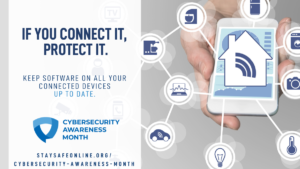If You Connect It, Protect It
 Internet-connected devices are among everyday norms for most people, and in recent years, the use of smart home devices has skyrocketed. According to a Statista report, global smart home market revenue is expected to reach more than $141 billion by 2023.
Internet-connected devices are among everyday norms for most people, and in recent years, the use of smart home devices has skyrocketed. According to a Statista report, global smart home market revenue is expected to reach more than $141 billion by 2023.
Appliances, smart TVs and other home technologies, along with billions of other personal devices such as smartphones, wearable technologies, toys and more are referred to as consumer Internet of Things (IoT). These devices are not only internet-connected, but they also collect and share data. Gartner, Inc., a global research and advisory company, forecasts that 25 billion connected things will be in use by 2021.
Consider this:
- The number of cellular IoT connections is expected to reach 3.5 billion in 2023 — increasing with an annual growth rate of 30%. (Ericsson)
- When asked, 63% of people find connected devices ‘creepy’ in the way they collect data about people and their behaviours. (Consumers International & Internet Society)
- Once plugged into the internet, connected devices are attacked within five minutes and targeted by specific exploits within 24 hours. (NETSCOUT)
Whether or not you consider yourself smart home savvy, it’s important to make sure your equipment is protected — just as you would with all other internet-connected devices. As we recognize Cybersecurity Awareness Month, let’s bring attention to a checklist of key things you can do to safeguard your devices and data.
Take-Action Checklist
- Do Your Homework: Before purchasing a new smart device, do your research. Check out user reviews on the product, look it up to see if there have been any security or privacy concerns, and understand what security features the device has or doesn’t have.
- Change Default Usernames & Passwords: Many IoT devices come with default passwords. Create long and unique passphrases for all accounts and use multi-factor authentication (MFA) wherever possible. MFA will fortify your online accounts by enabling the strongest authentication tools available, such as biometrics or a unique one-time code sent to your phone or mobile device.MFA at Elon utilizes DUO Security for access to email, Moodle and other single-sign-on service. This free service may also be used for some personal accounts. All faculty and staff will be required to begin using the service by the end of the year. Visit the MFA enrollment guide to learn more.
- Put Your IOT Devices on a Guest Network: Why? Because if a smart device’s security is compromised, it won’t grant an attacker access to your primary devices, such as laptops.
- Configure Your Privacy & Security Settings: The moment you turn on a new smart device, configure its privacy and security settings. Most devices default to the least secure settings, so take a moment to configure those settings to
your comfort level. - Disable Features You May Not Need: IoT devices often come with features you will never need or use. If you can, disable those features to maintain your security and privacy.
- Keep Software Up to Date: When the manufacturer issues a software update, make sure that you install it immediately. Updates include important changes that improve the performance and security of your devices.
- Think of Where You Put Them: Particularly for listening devices or ones with cameras, think strategically about where you place them in your home. Do you want them in a child’s room or where you have sensitive work or family
discussions? Designate some areas of your home as “safe” rooms, away from IoT devices.
Download and share this free printable for easy reference.
All month long, the Office of Information Security is celebrating Cybersecurity Awareness Month (CSAM) by offering resources, tips and fun opportunities for faculty, staff and students to learn ways to protect personal and university data and stay safe online. Visit the Information Security website to learn more and be sure to follow us on Facebook, Instagram and Twitter for updates. We’ll use #BeCyberSmart and #ElonSecure to keep you informed.
More Resources
- Buying or selling a “smart” home? Read this. — Federal Trade Commission (FTC)
- What is the internet of Things (IoT) and how can we secure it? — National Institute of Standards & Technology (NIST)
- Securing the Internet of Things — Cybersecurity & Infrastructure Security Agency (CISA)
 Follow
Follow